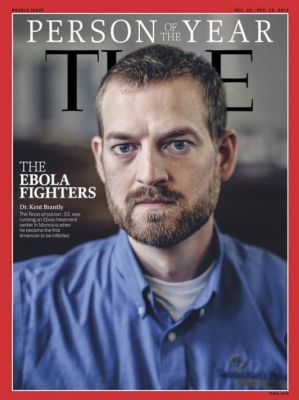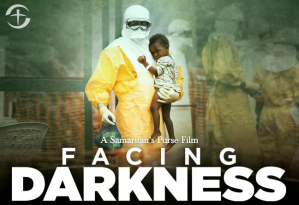Franklin Graham clearly remembers the day in 2014 he was told Dr. Kent Brantly, a young doctor working with Samaritan's Purse, had contracted the deadly Ebola virus in Liberia and was certainly going to die.
"When I found out he had Ebola, it was was the lowest points in my life," Graham, the president of Samaritan's Purse and the Billy graham Evangelistic Association, told The Gospel Herald. "This young doctor who was there to serve in the name of Jesus Christ was now going to die in Africa, and I couldn't do anything about it. I knew that it was a death sentence, and there was almost nothing that I could do. The doors were closing and the time was ticking. When you get Ebola, you've got about get ten days max and you're dead."
Dr. Brantly wasn't the only one to become infected with the virus that claimed hundreds of lives every week. Nancy Writebol, a nurse who had been assisting Dr. Brantly at ELWA Hospital in Monrovia, was also diagnosed with Ebola a short time later.

Facing Darkness, a new documentary from Samaritan's Purse, gives an in-depth look at the struggles that came with fighting one of the deadliest epidemics of the century and the faith and determination that eventually led to the recovery of both Dr. Brantly and Writebol.
"God had a plan, and that's what this film is about," Graham explained. "It's about God working a miracle, and not just one. It's not only saving Dr. Brantly and Nancy Writebol, but at the same, their situation educated the world as to what Ebola was and how to fight it and deal with it. This country had no clue on how to fight Ebola until Dr. Brantly became ill. All of the sudden, the world's most dangerous virus - which the US was ignoring - was here, and it woke America up."

Ebola infected more than 28,000 people in Liberia, Guinea and Sierra Leone, and claimed over 11,000 in just a few months. Once news of the missionaries' infection hit, the team at Samaritan's Purse worked tirelessly to return Dr. Brantly and Writebol back to the United States for treatment - a seemingly impossible feat.
At one point in the film, Dr. Brantly, who now works as a physician for the JPS Health Network in Fort Worth, says, "Faith is not something that makes you safe" - a statement Graham says should empower every Christian.
"I want everyone to know that whatever storms in life you face, God is there with us. If we put our faith in Christ, we don't have to be afraid. Even if our life comes to an end, so what? We go directly into the presence of Almighty God. We will all face darkness from time to time - we're going to go into those storms. I want people to know that God is there, and Dr. Brantly and the others are testimonies to God's goodness and if He can do it for them, he can do it for us."
Facing Darkness will be shown one night only in theaters across the country on March 30. Graham said he hopes the film encourages audiences and helps raise up an "army" of young people seeking to respond to God's call.
"I pray God would raise up an army of young men and women who will see this film and go and do likewise," he told GH. "I pray that, like Dr. Brantly and Nancy Writebol, young people will be willing to go to the farthest corners of the world, the darkest places of the world, the most dangerous parts of the world, to make a stand for Christ. That's my prayer, that God would use this film to touch the lives of another generation for him."






